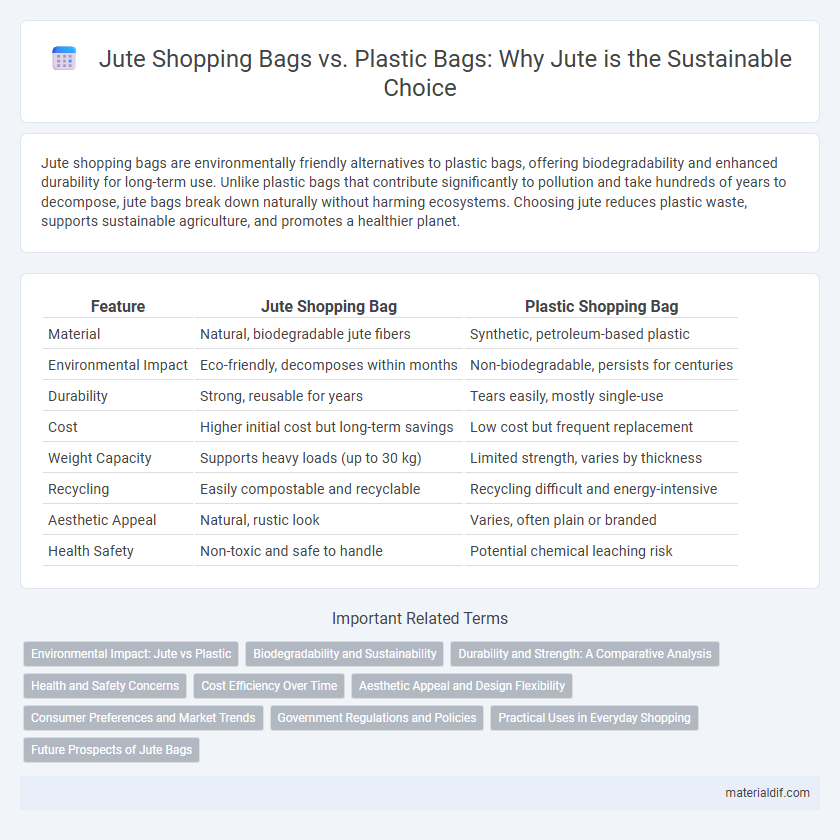Jute shopping bags are environmentally friendly alternatives to plastic bags, offering biodegradability and enhanced durability for long-term use. Unlike plastic bags that contribute significantly to pollution and take hundreds of years to decompose, jute bags break down naturally without harming ecosystems. Choosing jute reduces plastic waste, supports sustainable agriculture, and promotes a healthier planet.
Table of Comparison
| Feature | Jute Shopping Bag | Plastic Shopping Bag |
|---|---|---|
| Material | Natural, biodegradable jute fibers | Synthetic, petroleum-based plastic |
| Environmental Impact | Eco-friendly, decomposes within months | Non-biodegradable, persists for centuries |
| Durability | Strong, reusable for years | Tears easily, mostly single-use |
| Cost | Higher initial cost but long-term savings | Low cost but frequent replacement |
| Weight Capacity | Supports heavy loads (up to 30 kg) | Limited strength, varies by thickness |
| Recycling | Easily compostable and recyclable | Recycling difficult and energy-intensive |
| Aesthetic Appeal | Natural, rustic look | Varies, often plain or branded |
| Health Safety | Non-toxic and safe to handle | Potential chemical leaching risk |
Environmental Impact: Jute vs Plastic
Jute shopping bags significantly reduce environmental impact compared to plastic bags due to their biodegradability and lower carbon footprint during production. While plastic bags contribute to long-lasting pollution and marine life harm, jute decomposes naturally within months and supports sustainable agriculture. Transitioning to jute bags helps decrease plastic waste accumulation and promotes eco-friendly consumer habits.
Biodegradability and Sustainability
Jute shopping bags are highly biodegradable, decomposing naturally within a few months without leaving harmful residues, unlike plastic bags that persist for hundreds of years and contribute significantly to environmental pollution. The sustainable cultivation of jute involves minimal use of pesticides and fertilizers, making it an eco-friendly alternative to plastic, which relies heavily on non-renewable fossil fuels for production. Choosing jute over plastic supports carbon sequestration and reduces the carbon footprint associated with single-use plastics, promoting long-term environmental health.
Durability and Strength: A Comparative Analysis
Jute bags exhibit superior strength and durability compared to plastic bags, as their fibrous texture withstands heavy loads without tearing or stretching. The natural resilience of jute fibers ensures prolonged usability and resistance to wear and tear, making them ideal for repeated shopping trips. Plastic bags, while lightweight, tend to degrade quickly and lack the robustness required for heavy or sharp items, often resulting in breakage and limited lifespan.
Health and Safety Concerns
Jute bags offer a natural, biodegradable alternative to plastic bags, significantly reducing exposure to harmful chemicals and toxins often found in plastic. Unlike plastic, which can release microplastics and endocrine disruptors that pose health risks, jute does not leach hazardous substances into food or the environment. Using jute for shopping promotes safer handling of groceries and contributes to minimizing pollution-related health problems.
Cost Efficiency Over Time
Jute shopping bags offer superior cost efficiency over time compared to plastic bags due to their durability and reusability. While plastic bags are often cheaper initially, they tend to degrade quickly and require frequent replacement, increasing long-term expenses. Investing in jute bags reduces overall costs by lasting for years, minimizing the need for continuous purchases and supporting sustainable consumer habits.
Aesthetic Appeal and Design Flexibility
Jute shopping bags offer a natural, rustic aesthetic with customizable textures and earthy tones that enhance visual appeal compared to the often sterile look of plastic bags. The design flexibility of jute allows for intricate patterns, embroidery, and vibrant printing, making each bag unique and stylish. Plastic bags lack this creative potential, usually limited to simple logos or text, which diminishes their overall attractiveness and personalization options.
Consumer Preferences and Market Trends
Jute shopping bags are increasingly favored by consumers due to their eco-friendly, biodegradable properties and durability, contrasting sharply with the environmental drawbacks of plastic shopping bags. Market trends show a significant surge in demand for jute products, driven by growing awareness of plastic pollution and government regulations limiting single-use plastics. Consumer preferences are shifting toward sustainable alternatives as brands incorporate jute into their product lines to meet environmental standards and appeal to ethically minded shoppers.
Government Regulations and Policies
Government regulations increasingly favor jute shopping bags due to their eco-friendly, biodegradable nature, aligning with national policies aimed at reducing plastic pollution. Many countries enforce bans or taxes on single-use plastic bags, encouraging retailers and consumers to switch to sustainable alternatives like jute. Policies promoting jute cultivation and manufacturing support economic growth while enhancing environmental conservation efforts.
Practical Uses in Everyday Shopping
Jute bags offer eco-friendly, durable alternatives to plastic bags, capable of carrying heavier loads without tearing during everyday shopping trips. Unlike plastic shopping bags, jute bags are reusable, biodegradable, and promote sustainable consumption by reducing plastic waste in the environment. Practical uses of jute bags include grocery shopping, carrying produce, and storage, making them ideal for reducing single-use plastic reliance.
Future Prospects of Jute Bags
Jute bags offer a sustainable alternative to plastic shopping bags, with increasing global awareness driving their adoption due to biodegradability and eco-friendliness. Future prospects of jute bags include enhanced durability through technological advancements in fiber processing, making them more competitive in the retail market. Government regulations banning single-use plastics also create a favorable environment for the growth of the jute bag industry worldwide.
Jute Shopping vs Plastic Shopping Infographic

 materialdif.com
materialdif.com